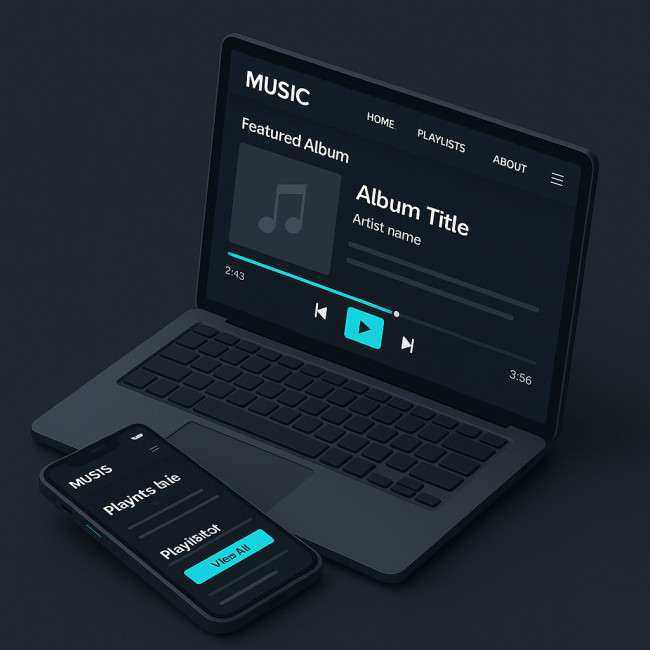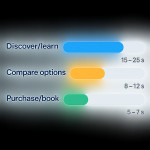Accessible colour palettes for music sites: ADA compliance without dulling vibe
Ready to craft a music website that grooves and passes ADA checks? This guide shows you how to build accessible colour palettes for music sites without muting personality, so every fan, booker and sponsor enjoys an inclusive, on-brand experience.
Why accessible colour palettes matter on music sites
Music audiences span every age, culture and ability. An accessible colour palette for music sites ensures lyrics, tour dates and merch details remain readable for users with low vision, colour-blindness or temporary glare. Beyond empathy, strong contrast improves mobile legibility and lowers bounce—two signals Google rewards, as outlined in the musician SEO checklist.
ADA & WCAG in one minute
- ADA Title III: U.S. businesses must offer equal digital access.
- WCAG 2.2 AA: Text–background contrast ≥ 4.5:1 (normal text) and ≥ 3:1 (large text).
- Non-colour cues: Shape, icons or text must supplement colour-only signals.
Key principles of an accessible colour palette for music sites
1. Contrast ratio first
Check primary and secondary text against backgrounds with tools like WebAIM Contrast Checker. Aim above 7:1 for body copy when your style embraces dark-mode or neon accents.
2. Hue & saturation balance
An accessible colour palette for music sites can still feel edgy: pair a desaturated base (#111 or #fafafa) with saturated accents (#ff0055 for pop, #31d0c6 for lo-fi). High saturation across every element causes cognitive fatigue and fails contrast when text overlays images.
3. Avoid colour-only cues
Underlines on links, “play” icons on audio buttons and focus rings for keyboard navigation help users who cannot perceive reds or greens. For more inclusive patterns, skim our screen-reader optimisation guide.
Building an accessible colour palette without killing vibe
Step 1 – Define the musical mood
List three brand adjectives—e.g., “gritty”, “soulful”, “futuristic”. Map each to colour psychology insights (see the colour psychology updates article). This anchors palette choices in story, not guesswork.
Step 2 – Set the contrast pairs
| Element | Accessible pair | Contrast ratio |
|---|---|---|
| Body text | #1a1a1a on #ffffff | 15.8 : 1 |
| CTA button | #ffffff on #31d0c6 | 5.1 : 1 |
| Muted meta data | #666666 on #ffffff | 5.9 : 1 |
| Footer text | #e2e2c8 on #111111 | 10.2 : 1 |
Step 3 – Accent with restraint
Limit vivid shades to 10 % of UI components. On a merch page, a neon badge draws the eye; use neutral greys elsewhere to keep overall accessibility intact.
Step 4 – Test on devices & with people
Simulate deuteranopia in Figma or Chrome DevTools, then hand your prototype to at least one colour-blind fan. Real feedback trumps automated scores. Embed your refreshed site in new musician portfolios on Artfolio to gauge wider reactions.
Tool stack for effortless compliance
Browser & design plugins
- Adobe Color Accessibility Tools—preview contrast and safe combos.
- Stark—Sketch/Figma plugin highlighting failing layers in real time.
- axe DevTools—browser extension listing WCAG errors per page.
Automated scanners
Schedule weekly Lighthouse audits. Pair scores with a style-lint rule set so failed contrast blocks commits. Your developer will thank you.
Live assistive-tech checks
Navigate the site with a keyboard and screen reader. Ensure focus indicators remain visible against every background—an often-missed colour contrast checkpoint that the inclusive design checklist also stresses.
SEO, brand equity & performance perks

An accessible colour palette for music sites reduces image overlays and heavy gradients, trimming file sizes and improving Core Web Vitals. Faster pages, paired with semantic HTML, climb Google rankings and attract A&R reps hunting fresh acts. Cleaner code even speeds updates when tour dates change at 2 a.m.
Source : WebAIM Million Report
Quick self-test: Are your colours accessible?
FAQ
- Can an accessible colour palette for music sites include neon colours?
- Yes—use neon accents sparingly against neutral or dark bases and verify contrast for any text layered on top.
- Do dark-mode themes meet ADA rules automatically?
- No. Dark mode often relies on light text; you must still hit 4.5:1 contrast and maintain visible focus states.
- How many colours should I limit my palette to?
- Four to six core shades (primary, secondary, muted text, background, accent) keep maintenance simple and testing reliable.
- What is the fastest way to audit an existing site?
- Run axe DevTools, then cross-check flagged colours in WebAIM Contrast Checker. Fix high-impact items like nav text first.
- Does accessibility improve conversion?
- Clients report up to 20 % longer session times after contrast updates, mirroring findings in engagement etiquette research.
Next step: Turn insight into action
Audit two key pages today—home and merch—using the principles above. Refine your accessible colour palette for music sites, hit publish, and watch metrics rise. Need a wider brand overhaul? Our studio books new projects each quarter; reach out and keep the vibe alive for everyone.











